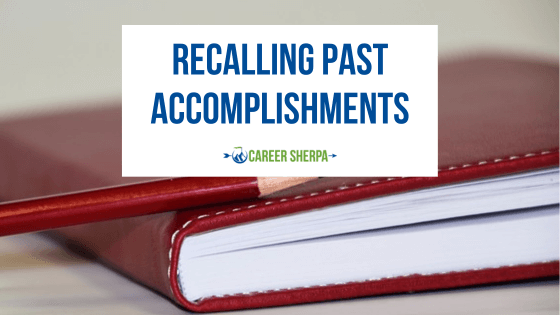Recalling your past accomplishments is an important first step during the job search process. These stories are the proof you need to show future employers.

If you are just starting your job search, recalling your past accomplishments is a great way to identify your strengths and transferrable skills plus this will help you pinpoint what you enjoy doing!
You will use these accomplishments on your resume, LinkedIn profile, and when answering behavioral interview questions!
BONUS: Even in your new role, you should keep track of your accomplishments! It will help with your performance reviews and even regular updates with your manager.
How To Use Accomplishments To Identify Your Skills
When you look back on your career and your successes, you will see patterns and themes. You may notice that the times you were most successful and happy at work happened while doing certain activities, like solving problems, mentoring people, or helping customers or clients.
These are the activities you would want to do again in your next job. And these are the accomplishments you want to highlight for future employers to notice.
But the first step is for you to remember and write down these specific moments of personal success and satisfaction.
Questions To Help You Brainstorm Accomplishments
Here’s a list of questions to get you started clearing away the cobwebs and remembering your past accomplishments. All you need to do is jot down a few words so you can remember the accomplishment later.
- What were you proud of doing at work?
- What did you do better than others around you?
- Were you ever recognized (formally or informally) for work that you did?
- Did you ever go above and beyond what was required of you?
- Were you ever selected to be a part of a team or train others?
- Did you identify and solve a problem?
- Did you save time and/or money?
- Have you improved productivity?
- Have you ever streamlined operations?
- Did you devise new strategies?
- Did you minimize customer complaints?
- Did you provide a service that did not exist before?
- Did you develop an idea that was used or presented?
- Did you help others achieve their goals?
Write A STAR Story For Each Accomplishment
Once you have some of these answered, your next step is to document the story.
Always identify a specific situation.
You may solve customer problems every day. However, you will need to remember a specific time you helped a customer. I realize this is challenging. But the details of what you did and the result of your actions are key to documenting these stories.
STAR stands for:
Situation – (What was the situation?)
Task – (What were you being asked to do? What was the challenge to the situation?)
Actions – (Step by step, list all the things YOU did.)
Results – (What happened or didn’t happen as a result of what you did?)
Here’s a worksheet of the questions to download if you want.

Sharing Your Accomplishments Isn’t Bragging
So how do you talk about your accomplishments without bragging?
That’s what’s so great about your STAR stories, they aren’t bragging. Your stories just state the facts and the outcome of your actions. “This is what I did and this is what happened!”
If you get into the habit of recording your accomplishments regularly, it will become easier. Keep a list on your personal device so you always have access.
PS: These are great to send to your boss before a performance review.
Top 10 Reasons You Need Accomplishments
- Transferable Skills: Illustrate skills and qualities that can benefit a future employer.
- Showcase Value: Demonstrate how you made a positive impact in previous roles.
- Differentiation: Set yourself apart from other candidates by highlighting your unique contributions.
- Quantifiable Results: Provide solid evidence of your skills and achievements.
- Employer Confidence: Instill confidence in potential employers that you can deliver results.
- Relevance: Connect the dots so potential employers can see how your past experience aligns with the specific needs of the job.
- Interview Answers: Offer compelling stories and examples to discuss during interviews.
- Performance History: Prove your ability to meet or exceed expectations.
- Career Progression: Demonstrate growth and development over time.
- ROI: Indicate the return on investment an employer can expect by hiring you.
Answer Every Interview Question With A STAR story
To concisely convey your talents and abilities, learn how to use a STAR story to answer interview questions by reading Using The Star Interview Method Effectively + Questions.

Hannah Morgan speaks and writes about job search and career strategies. She founded CareerSherpa.net to educate professionals on how to maneuver through today’s job search process. Hannah was nominated as a LinkedIn Top Voice in Job Search and Careers and is a regular contributor to US News & World Report. She has been quoted by media outlets, including Forbes, USA Today, Money Magazine, Huffington Post, as well as many other publications. She is also author of The Infographic Resume and co-author of Social Networking for Business Success.
